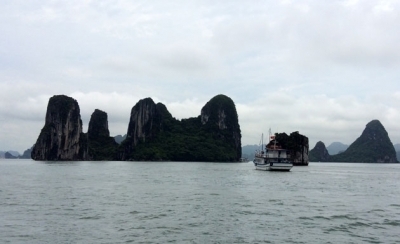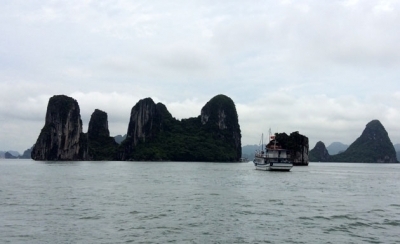


|
 Ha Long Bay
|
|
|
Concerns on livelihoods for indigenous communities
According to UNESCO, some of Vietnam's heritages are facing the
challenge of stabilising the lives of indigenous communities. Chief
Representative of UNESCO Office in Vietnam Michael Croft said that the recent
recommendation of the UNESCO World Heritage Centre for the World Heritage
site of Ha Long Bay, made mention of concerns on resettled communities in Ha
Phong ward since June 2014. While there is no report on the post-resettlement
situation, the Quang Ninh province’s report in 2016, through the Ministry of
Culture, Sports and Tourism, noted that certain households were experiencing
difficulties in adapting to the new habitat, while they are returning to the
Bay for "illegal activities ". The reasons reflected by the people
are a lack of public infrastructure, such as markets and schools being
located far away from resettlement sites, fishing ports, boat docks (12
kilometres).
The same situation has occurred in Phong Nha – Ke Bang, which is
a natural world heritage with typical ethnic minority groups that have lived
through generations in the forested core zone. These groups, including the
Ruc ethnic minority, are at risk of being separated from the social
development rhythms due to strict protection regulations that prevent them
from accessing caves and collecting forest products, while they are finding
it hard to find a position in the tourism value chain.
According to UNESCO, the recent programmes targeting ethnic
minorities, who are the most vulnerable, have not taken into account the
sensitive cultural approach that is leading to the erosion and risk of
diversification of culture, especially as a consequence of resettlement
projects. Tourism in Phong Nha - Ke Bang is growing, but the people are at
risk of being isolated from the pace of social development and losing their
traditional livelihoods, while having almost no opportunity to benefit from
the heritage income.
Pressure from development and modern life
Hoi An is the most typical example of this pressure. The demand
to develop a modern city, tourism and infrastructure creates pressure for Hoi
An. Michael Croft estimates that the rise of construction works in the buffer
zone located very close to the old town, and the rapid growth of hotels and
infrastructure around the town, overloaded transportation and a lack of
coordination of functional forces put a heavy burden on the core zone of
heritage.
The Hoi An Impression Theme Park
Recently, during construction of the Hoi An Impression Theme
Park, the public expressed concern over how the project directly affects area
I - the strict conservation area, and also impacts the flow of the Thu Bon
River. Although the work is known to have been included in the plan, this
also shows that even the planning must be consistent with the actual
conditions of the heritage.
Also related to the demand to develop tourism, the illegal
walkway construction in Cai Ha Mountain in Trang An (Ninh Binh) also raised
concerns for UNESCO. Although UNESCO has highly appreciated the timely action
of the Ministry of Culture, Sports and Tourism in dealing with this incident,
UNESCO still recommends empowering the World Heritage Committee and to be
more actively engaged in providing guidance as well as dialogues with both
the private sector and the local people to improve law enforcement and
prevent similar violations in the future.
According to UNESCO, although the Hue imperial relic site’s
development pressure is less severe, UNESCO has proposed that it is necessary
to build a landscape management plan, because the value of the heritage is
not only in the individual heritage elements, but also in the relationship of
the statue and feng shui, that reflects the unique philosophy of Vietnam,
emphasising the harmony between humans and nature.
UNESCO also recommends the need for specific guidelines, with an
approach basing on heritage preservation principles. Michael Croft affirmed
that UNESCO is not just an advisory body but will continue to have specific
support for the preservation of heritages in Vietnam.
|
Source: NDO